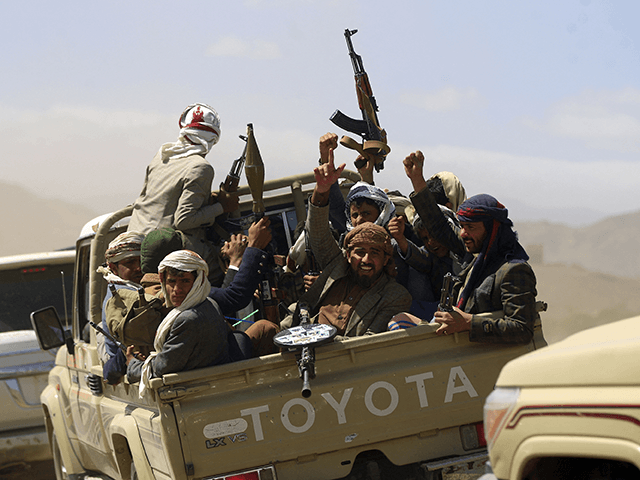The United Arab Emirates (UAE) on Monday intercepted a ballistic missile launched by the Iran-backed Houthis in Yemen.
It was the third major Houthi missile attack on the UAE in three weeks, and it occurred during the first official visit to the UAE by Israel’s head of state, President Isaac Herzog.
“The attack did not result in any losses, as the remnants of the ballistic missile fell outside the populated area,” reported Emirati state media quoted by the Associated Press (AP).
Although the UAE recently threatened to prosecute citizens who post unauthorized video of missile intercepts on social media, in this case the Emirati Defense Ministry officially released footage of a retaliatory strike that destroyed a ballistic missile launcher, purportedly located in the al-Jawf province of Yemen:
The AP suggested the speedy destruction of the launcher could mean the UAE “may be receiving Western intelligence assistance for its strikes.”
The U.S. Air Force intervened against a Houthi missile attack last week that targeted an Emirati air base in Abu Dhabi where American forces are stationed.
Haaretz on Sunday quoted Israeli defense experts who noted the UAE has downplayed each successful intercept of a Houthi attack, even though the first ballistic missile attack in January killed three people, targeted an oil facility near an American base, and also occurred during a visit by a foreign head of state, namely South Korean President Moon Jae-in.
Based on these details, the Israeli experts surmised that either American forces shot down the Houthi missiles, or Emirati troops did so using American equipment.
Houthi spokesman Yehia Sarei claimed on Monday that insurgents targeted “sensitive sites” in Abu Dhabi and Dubai with ballistic missiles and drones. He explicitly threatened to target international business interests in the UAE with further attacks.
“The Emirates will remain an adversary as long as the actions of the Israeli enemy continue in Abu Dhabi and Dubai,” Sarei angrily declared.
Israeli President Herzog met with Crown Prince Mohammed bin Zayed in Abu Dhabi on Sunday before the missile attack. Herzog expressed Israel’s support for the UAE’s security and condemned the previous Houthi terrorist strikes.
“We are here together to find ways and means to bring full security to people who seek peace in our region,” Herzog said.
“The Abraham Accords should be continued and more nations should join us,” he said, referring to the peace initiative launched by former President Donald Trump.
On Monday, Herzog visited the Expo 2020 world’s fair in Dubai and gave a speech in which he praised Israelis and Emiratis “standing together, learning each other’s cultures and languages.”
The Houthis have named the Expo as one of the targets they are eager to attack. At the request of Israeli officials, the Expo ordered journalists not to publish photos or video of Herzog’s visit for security reasons.
The AP quoted the Biden administration condemning the Houthi attack, while Iran condemned the Israeli president for daring to visit the UAE:
U.S. State Department spokesperson Ned Price condemned the Houthi attack. “While Israel’s president is visiting the UAE to build bridges and promote stability across the region, the Houthis continue to launch attacks that threaten civilians,” Price wrote on Twitter. From Tehran, Saeed Khatibzadeh, Iran’s foreign ministry spokesperson, condemned the Israeli president’s visit to the UAE.
“Invasion, expansionism and crisis-making are part of the nature of Israel’s policy,” he told reporters, describing the normalization of relations with Israel as a source of “rift-making in the Islamic and Arab worlds.”
When asked about Monday’s Houthi missile attack on the UAE, Khatibzadeh struck a softer note, saying the “cycle of violence should come to an end.”
The Iranians are calling for the end of a “cycle of violence” they helped to start, having supplied the Houthis with a good deal of their weaponry, including Zulfiqar ballistic missiles the Houthi spokesman claimed were fired at Abu Dhabi on Monday.
Despite the Houthis’ history of attacking civilian targets with the support of Iran, the world’s worst state sponsor of terrorism, President Joe Biden delisted the Houthis as terrorists shortly after taking office. Administration officials periodically grumble in public about the Houthis refusing to cut back on terrorism after receiving this gift from the president.
Calls for Biden to restore the Houthis’ terrorist designation have grown louder after each missile attack on civilian targets in Saudi Arabia and the UAE, although some humanitarian organizations are worried that if the Houthis are re-listed, they will interfere with efforts to provide food and medicine to the starving and sick population of war-torn Yemen.
At a January 19 press conference on the one-year anniversary of his administration, Biden was asked if he supported putting the Houthis back on the U.S. list of foreign terrorist organizations, as requested by the UAE.
“The answer is, it’s under consideration,” Biden replied.

COMMENTS
Please let us know if you're having issues with commenting.